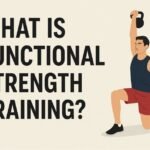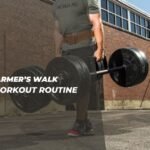Find Out the Answer to “Why Does My Stomach Hurt After a Workout” & How to Treat It
After a workout, when you get pain around the muscle that you just workout is good pain, and it’s often considered that you did a good workout. However, when you get unexpected pain from other parts of the body that you didn’t keep your session around, you would wonder how this pain is arising. For instance, after doing a shoulder workout, if you get pain in your stomach, then it’s apparent that you’ll question yourself: why does my stomach hurt after a workout?

Both the pain, whether good or bad, arises from your workout. Here the good pain results from your hard work, and another unexpected bad pain is the side effect you’re facing. Further, bad pain can be triggered in any part of your body. For example, the pain in your stomach or abdominal area isn’t unheard of.
Nonetheless, in this article, we’ll discuss about the stomach ache. Hence, let’s get into details and find out some common causes of stomach aches after or during your workout sessions.
Why Does My Stomach Hurt After a Workout? – Here Are Some of the Common Reasons
Here are some common reasons that increase the chances of stomach hurt, nausea, and other awful feelings that make you repeatedly question what’s wrong and why your stomach is hurting during or after you complete your workout.
Dehydration
During your workout, blood flows away from your gut and goes to larger working muscles. Hence, the volume of blood pumping through your body will go through an inadequate hydration effect leading to GI distress and gut immobility. Hence, you’ll face stomach ache once you complete your workout.
To avoid such situations, drink more water as often as possible. Also, ensure you keep your body hydrated well enough throughout the week and not only during your workout.
Medication
Though, it’s a no-brainer that everyone takes medicines according to the recommended dosage. However, pay close attention to the intake of anti-inflammatory medicines. For instance, if you’ve taken excessive ibuprofen or naproxen, you can get nauseous. Hence, you may muffle your ongoing knee pain using OTC anti-inflammatory to finish your intense workout session, but it may leave you feeling sick.
Therefore, it’s recommended that you take only what your doctor prescribes. Similarly, if you’re taking an anti-inflammatory, take it after your workout. Also, eat anti-inflammatory food along with it, such as berries, bone broth, and broccoli.
Workout Intensity
Your stomach can often hurt, and you may get nauseous due to the intensity and speed of your workout. For instance, a high-intensity workout may increase your chances of nausea during or after your workout because you work harder than your body can handle.
Hence, the solution is to reduce your workout speed or resistance till you feel normal again. Also, it’s recommended to stop your workout and re-join once you feel better.
Your Fitness Level
It’s reasonable to say that beginners push themselves too fast or hard, often leading to exercise-induced nausea, but it can be biased at all fitness levels. Similarly, GI distress is quite common among endurance athletes like long-distance cyclists and marathon runners; many are even in shape.
Similarly, if you eat too fast before your workout or eat right after your workout, then depending upon the intensity of your workout, you may end up with stomach aches after or even during a workout. Therefore, it’s recommended that you progress through your fitness level stage instead of jumping right into an expert level.
Food You Eat
Another common reason your stomach aches after workouts is your diet. For instance, if you eat a big meal right before jumping into a heavy intense workout, you may get stomach aches during or after a workout. However, it doesn’t mean you skip your meal, but it’s good to have a balanced diet that includes proper carbs, protein, and healthy fats. Also, it would help if you didn’t go right into a workout after having your meal and instead took some time so the meal you took gets digested.
Therefore, to avoid the situation of stomach aches after the workout, it’s best to examine your pre and post-workout eating habits. Those who usually don’t eat for a long time before a workout should try eating small snacks 30 minutes to an hour before the workout with a combination of protein, carbs, and healthy fats.
Hormones
You might have heard about positive hormonal changes that happen with workouts, also called the release of endorphins and lessening of cortisol levels. However, sometimes hormones affect your GI, which causes nausea leading to stomach aches before or after your workout.
Hence, it’s recommended that you pause your workout, especially if you’re doing heavy intense workouts, and get back to exercise once you feel better.
Let’s Find Out the Solution to Your Question – Why Does My Stomach Hurt After a Workout?
First and foremost, you’ll need to determine what side-effects you face according to your favorite fitness activity. Similarly, making strategies based on that will help reduce your stomach ache problem.
Stomach Ache Problem for Strength Training Enthusiasts
The most common reason behind your stomach ache after the workout is acid reflux and indigestion. For instance, if you’re bearing down for lifting weight while you hold your breath, it’ll increase pressure on your stomach area and often force acid into the esophagus. It means you’ll experience heartburn and also indigestion. Also, people who lift weights often experience reflux. Further, the quick way to reduce this issue is through drinking plenty of water, which will help wash away gathered acid in your body.
Prevention
Keep Your Form Proper:Yes, have proper form while working out. For instance, exhale as you contract your muscles for lifting weights and inhale as you release for every rep.
Avoid Food That Triggers Stomach Ache Issue: It’s best to cut back on reflux-aggravating food like citrus, coffee, peppermint, onions, and chocolate.
Stomach Ache Problem Faced by Runners
Whether you might be jogging or someone who does a marathon race, stomach ache is possible. Runners often face abdominal cramping or side stitches once their lower GI issue gets triggered. Further, long-distance runners often report such cramping issues. To fix this issue fast, you should lower your pace until your heart rate decreases and you feel comfortable. Also, for side stitches, you should change your stride, slow down or even twist your torso gently towards the opposite direction of the side stomach ache.
And to prevent it from happening, you should:
Keep Yourself Hydrated: Drink around 4 to 6 ounces of water every 15 to 20 minutes during your workout. Also, you can alternate between water and sports drinks to replenish electrolytes.
Avoid Soda: Like Cola, soda is often used as a pre-race drink with stimulating effects due to caffeine & sugar content. However, carbonated air bubbles can cause bloating, which may give you stomach aches.
Don’t Eat Meals High in Fat Content: Eating meals with high-fat content before your big workout, along with caffeine, lactose, or sorbitol, can activate your GI tract. Hence, avoiding it before 4 – 5 hours of running is best.
Try These Natural Remedies for Stomach Ache Issue
Nonetheless, if you’re looking for natural remedies for your stomach hurt after a workout, you can go for herbs that may help resolve workout-induced stomach aches. For instance,
- Try chamomile for gas & heartburn. You can take it before bedtime, and it’ll be anti-inflammatory. A cup of chamomile tea is best to soothe & calm your entire digestive tract.
- Those who feel nausea they should try Ginger. It helps settle stomach issues by suppressing gastric contractions & aiding your digestion.
- For cramps issues, you can try peppermint. It has menthol that helps control muscle spasms, leading to stomach cramps.
Closing Thoughts
You end up with stomach pain and nausea after your workout for various reasons. For instance, it can be due to dehydration, overeating before your workout, or doing exercise too intensely. Nonetheless, if you’ve questions like why does my stomach hurt after a workout or why I’m getting stomach ache after completing an exercise, then here we’ve covered some of the common reasons which will help you understand the reasons. Similarly, you’ll also find some prevention methods. Good luck!






